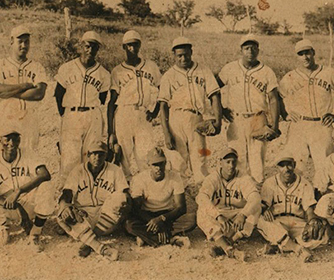Voices from the Invisible Diamonds

Kerrville All Stars, c. 1949, Photo credit Clifton Fifer

Kerrville All Stars, c. 1949, Photo credit Clifton Fifer
(July 15, 2016) -- The University of Texas at San Antonio (UTSA) Institute of Texan Cultures leads a conversation on Negro League Baseball, Saturday, July 16, 1:30 to 3:30 p.m., with "Voices from the Invisible Diamonds."
The initial Invisible Diamonds presentation, held in the spring, garnered the attention of Damion Thomas, Ph.D., sports curator of Smithsonian’s National Museum of African American History and Culture. Thomas will give the keynote presentation at Saturday’s event, highlighting the role sports played in these players’ communities.
Following Thomas’ presentation, Layton Revel, Ph.D., founder and director of the Center for Negro League Baseball Research in Carrollton, Texas, will moderate a roundtable discussion between former members of Negro League baseball teams from San Antonio and Kerrville, including:
• Joseph ‘Lefty’ Vaughns – San Antonio
• Raymond ‘Red’ Hardee – Kerrville
• Joe Lewis – Kerrville/Traveling teams
• Marion Shaw – Kerrville
"Getting the stories first-hand, from the people who played in these leagues and lived these experiences – that’s the treasure and the story we’re here to pass along and preserve," said Greg Garrett, UTSA museum educator and researcher for the project. "Sports transcend race and color. What mattered was the skill of the athlete on the field, not the color of the athlete’s skin."
Where the first presentation highlighted some of the places where the African American teams played, and the impact Negro League teams had on their communities this event will gather players to tell the stories in their own words. The event concludes with a question and answer session and meet and greet with players and experts.
"This second installment of our Invisible Diamonds programming will allow visitors to meet some of the individuals behind Negro League baseball in Texas," said Garrett. "They will be able to experience the emotion and pride these players felt in the stories and memories they share. We hope that it gives context to baseball as a tool that helped lift up these communities in their quest for social equality."
The Institute of Texan Cultures is located on the UTSA Hemisfair Campus, 801 E. César E. Chávez Blvd., a short distance from the Alamo and the River Walk. The museum will waive standard admission from noon to 5 p.m. on Saturday, July 16. Regular hours are 9 a.m.-5 p.m., Monday-Saturday; noon-5 p.m.
By James Benavides
Senior Communications Specialist, UTSA Institute of Texan Cultures
-------------------------------
For more information, call 210-458-2300 or visit TexanCultures.com.
Connect with UTSA online at Facebook, Twitter, YouTube, and Instagram.
Events
The UTSA Office of Undergraduate is proud to celebrate National Undergraduate Research with an annual event sponsored by the (OUR) featuring students will showcase undergraduate student research and creative endeavors from all disciplines across campus.
Various LocationsDía en la Sombrilla, formerly Fiesta UTSA, is a festival hosted each spring as a part of Fiesta® San Antonio events. Sponsored by Roadrunner Productions, the event features music, food, confetti, games, event t-shirts, and more.
Sombrilla Plaza and Central Plaza, Main CampusFiesta Arts Fair features contemporary art from more than 100 artists from across the U.S., Fiesta favorite foods, drinks, live music by local and regional performers, and a Young Artists Garden providing opportunities for budding artists to learn, explore and express their creativity.
UTSA Southwest CampusJoin the PEACE Center and Wellbeing Services for Denim Day, a day of learning about the importance of consent and why we wear denim on the last Wednesday of the month each April during Sexual Assault Awareness Month. Stop by our Denim Day display to take a photo in front of our Denim Wall, spin the "Is It Consent?" Wheel, and get a Concha or goodie.
Student Union Window Lounge, Main CampusLearn to use Zotero®, a citation manager that can help you store and organize citations you find during your research. Zotero can generate bibliographies in various styles, insert in-text citations and allow you to share sources with collaborators.
Virtual EventThis event is to achnowlege the graduating seniors and induct the new cohart of scholars to our program.
North Paseo Building (NPB 5.140,) Main CampusCelebrate the accomplishments of College of Education and Human Development, College for Health, Community and Policy, College of Sciences and University College.
Alamodome

